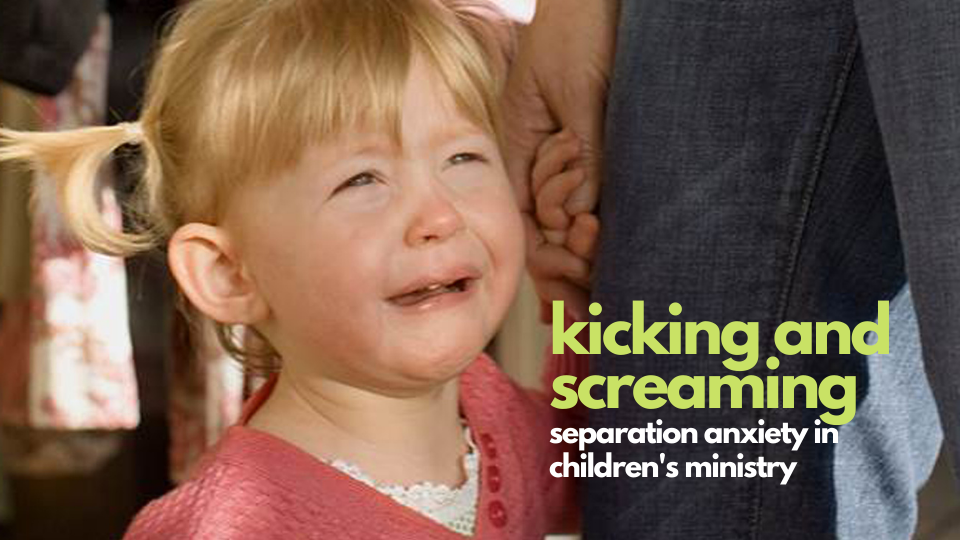Kicking & Screaming: Separation Anxiety in Preschool Ministry

Several years ago, my wife and I assumed the role of volunteer pastors of our church’s preschool ministry. There is never a dull moment when, in any given week, you are ministering to around 60 children ages birth to pre-K. Every ministry session seems to bring something new and unpredictable when interacting with some of the most excitable members of the church community. Although each session is unique, one thing often remains the same: at least one child enters with apprehension, crying, or worse, screaming due to separation anxiety.
I believe separation anxiety is one of the greatest challenges that both preschool ministers and the parents they serve have to face. An upset, screaming child can disrupt ministry sessions and, if not quickly extinguished, spread like wildfire. Also, parents can become frustrated because of their suffering child.
Preschool ministers serve in the “prime time” for separation anxiety. Experts tell us it can begin around 8 months of age and continue until a child is 5 or 6. Understanding the common reasons for separation anxiety can often help us more lovingly and patiently see our children and their parents through this phase of their development.
So why do our children go through this stage?
- Separation anxiety signals that children are becoming aware of their surroundings. They often exhibit anxious behavior because they do not see their parent and are trying to bring them close to them. Also, since our younger children have no concept of time, they have no understanding how quickly their parents will return.
- If a child is experiencing a significant transition in life, they will likely exhibit separation anxiety. Change often brings anxiety to many of us, but it can be amplified for younger children. Changes in the home, family, or surroundings can create severe insecurities for children and spark anxiety in your ministry. Recognizing these events can especially help our patience level with these children.
So how can we combat separation anxiety in our ministries?
We can lessen the impact of separation anxiety through consistent routines that help children feel secure. You can do so by making the initial activities of your ministry consistent in each session. In our ministry, we begin each session with 15 minutes of center-based playtime. This allows children to be involved in activities that interest them and allows our staff to interact on an individual basis with each child. If a child exhibits ongoing anxious behavior, encourage parents to establish a routine before dropping off the child (visit the restroom, share a hug, share consistent parting words).
Know your limits.
There will be some situations where you have to acknowledge that separation anxiety is serious and may require repeat introductions to your ministry setting before a child feels comfortable to stay. Some of this will require subjective assessment based on how intensely the child cries or if they become aggressive or angry. You might also establish a timeframe for allowing a child to cry. For example, after five or ten minutes of continuous crying the parent will be called.
Here are a couple of additional quick notes when dealing with separation anxiety in your ministry:
- As tempting as it may be, never encourage a parent to sneak out whenever a child is not looking. This will often leave a child thinking the absolute worst.
- Assure the parent of an anxious child that a period of adjustment is normal.
- As appropriate, take the crying child into your arms to help them feel secure. Rocking and singing to smaller children can often calm them down quickly.
- Ask the child to help you with a task, such as, “Would you like to help me prepare for our game?”
- Provide the child with an overview of the day’s schedule, highlighting the fun things that are coming or appeal to their interests.
- Encourage children to bring a toy or stuffed animal that he finds comforting.
- Do not prolong the situation by asking parents to stay until their child has calmed down. Decide on an agreed time at which you will contact them if their child is still crying.
- Give the child a measure for when their parent will return by saying something like, “mommy will be back after snack time.” This also helps the child know that something fun is coming.
- If a child has to prematurely leave your ministry, reassure the child and parents that you want them to come back!
- Never scold or rebuke the child. Separation anxiety is an emotional state, not a discipline problem.
A child’s anxiety should be taken seriously. We should treat our preschoolers with patience and love. As you lovingly see them through this stage of development, you will help establish trust with the child and their parent, laying a foundation for ongoing ministry to both.
